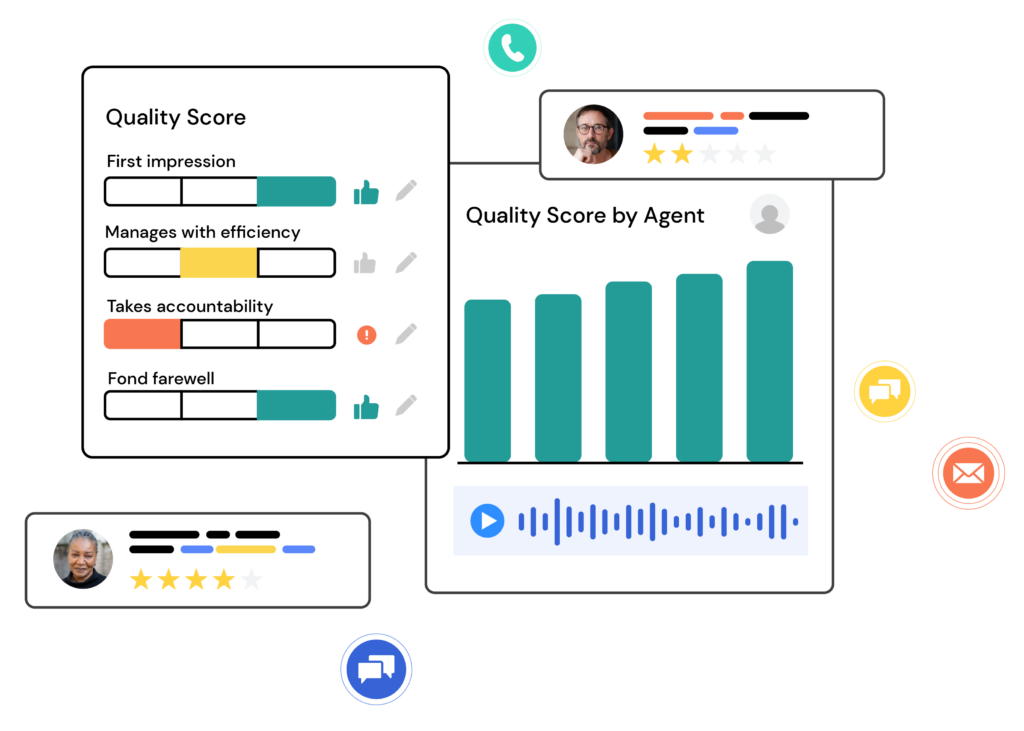A comprehensive view of agent performance
Traditional quality feedback doesn’t account for the human side of the experience. Maximize existing conversation data to uncover actionable call center insights.
Learn More
Develop and build a truly customer-centric experience in today’s healthcare environment.

Leverage customer interactions to create actionable healthcare intel.
Improve agent-to-customer sentiment and increase quality scores by listening to customer interactions at scale.
See Authenticx in ActionStorytelling in Healthcare
Modern storytelling can accomplish many of the same things that ancient storytelling once did – stories can make us laugh, make us cry, and make us think differently about certain problems or paradigms. For hundreds if not thousands of years, stories were how human beings passed knowledge on from generation to generation, and so storytelling can also be an educational tool. Storytelling can also help fill gaps in communication between two parties by allowing empathy to develop where it might not have previously.
The power of storytelling – using narrative in the healthcare context especially – can provide hope, a path toward empathy and understanding, and an opportunity for the storyteller to feel heard or seen. One might not immediately think of storytelling when imagining modern healthcare methodologies and practices, but storytelling can accomplish quite a bit for doctors, patients, and other healthcare professionals.
Patient storytelling and narrative medicine play an important role in storytelling in public health. A patient can tell their healthcare provider a story about their life or medical history to provide a greater understanding of a specific medical condition, for instance. Similarly, doctors, nurses, and other healthcare professionals can tell patients stories about their experiences in healthcare that can make certain procedures seem less intimidating, for instance. There are numerous scenarios where it might be beneficial for patients and healthcare providers to exchange stories.
Storytelling in healthcare can allow a health storyteller to provide patients with additional information or comfort, especially when facing a formidable diagnosis. There are also innumerable support groups and group therapy sessions for people experiencing medical crises where patients and survivors can share their stories and express themselves freely. Many patients cite these types of communities as indispensable while undergoing treatment. Healthcare professionals generally understand the many benefits of a robust support network, especially for patients who may be facing a really difficult prognosis.
And for a doctor to properly treat a patient, they generally like to know as much as possible about the patient’s medical history, any allergies or medications they may already be taking, and any other information that could be relevant to the preservation of the patient’s health. Storytelling can empower patients to ensure that their voices and concerns are heard, and healthcare professionals have more information to help them decide on the best and most appropriate medical response.
Storytelling in Healthcare Examples
Storytelling in healthcare examples could include a patient talking to an emergency room doctor about the last time they were in an emergency room – the symptoms they were experiencing, how doctors responded, and the outcome. This gives the present doctor a much clearer picture of what might be happening and can expedite the treatment or recovery process.
Similarly, patient story examples or patient safety story examples can help other patients develop trust in a healthcare facility or provider. When other patients provide testimonials about the quality of care they received from a certain facility or doctor, future patients may have their anxieties assuaged. In some cases, especially when time is of the essence, this can help save lives by allowing patients to proceed more quickly with certain treatments.
Patient stories in healthcare are important for other patients who may be going through a similar experience. They can also give healthcare providers in-depth insight into the patient experience. In industries around the world outside of healthcare, it’s highly important to collect as much information or data about a particular subject before making a decision. Businesses spend hundreds of millions of dollars annually collecting data from customers and marketplaces and elsewhere why? To make better-informed decisions that lead to better, more desirable outcomes. The same can be true within healthcare atmospheres as well – the more information a doctor or health team has, the more likely they are to provide quality care for patients in need.
Storytellers within healthcare work to bridge gaps, foster healthy, empathetic relationships, and attempt to ensure that patients receive the care they need. Storytellers can also help doctors and other practitioners communicate more clearly with patients and potential patients. Many healthcare facilities welcome patient stories and testimonials in order to understand how to provide better care in the future and to provide evidence to current or future patients of the quality of care they can expect to receive.
Purpose of Storytelling
Human beings have a rich history of storytelling that can be traced back to some of the earliest narratives. Indeed, before the invention of written language, storytelling is how humans passed knowledge on from one generation to the next. The purpose of storytelling, in the broadest sense, is to convey an idea or recount events to an audience. Storytelling theory speaks to the parts of the human mind that are able to make inferences and connections when presented with certain information. In other words, storytelling can empower people to imagine or envision scenarios and stories that they might not have had access to otherwise.
Contemporary storytelling relies on many of the same tropes and techniques that were first used when humans learned to tell stories to one another. The preferred storytelling method may have changed somewhat, especially now that modern society is inundated with digital screens and seemingly endless streams of media. Whether a patient tells a story verbally to their primary care physician or a healthcare provider tells a story about the type of procedures their office specializes in, these stories matter and are highly purposeful within the healthcare industry. For instance, a good storytelling introduction can usually give listeners a clue about some of the information they can expect from the story. For patients, stories can quell anxieties about their symptoms or diagnosis, and for doctors, stories can provide a fuller picture when combined with medical records and previous treatment information.
How It Works
Gain a deeper level understanding of contact center conversations with AI solutions.
See a PreviewAggregate
Pull customer interaction data across vendors, products, and services into a single source of truth.
Analyze
Collect quantitative and qualitative information to understand patterns and uncover opportunities.

Activate
Confidently take action with insights that close the gap between your organization and your customers.
What is Storytelling?
What is storytelling, and why is it important? To answer the question “what is storytelling,” it helps to understand the context in which a story is being told. There is an appropriate time and place for each story, but it’s vitally important to know what kind of story will be effective (let alone appropriate) for any given situation.
What is storytelling in business? – In business settings, storytelling can accomplish quite a bit. Sometimes customers prefer organizations that position their identity as a kind of story – like a young entrepreneur who sees a desperate need within a marketplace but no solutions and is able to build a company from the ground up just to fulfill that need. Many customers like stories such as this because they provide context and additional information customers would have otherwise been completely unaware of.
What is storytelling marketing? – In marketing, storytelling can provide an opportunity for marketers to appeal to various audiences based on the story they wish to tell. If your organization sells products or services, a marketing team’s approach to storytelling might be to tell the story about how everyday consumers discovered the company’s products or services and improved the customer’s quality of life.
What is the storytelling method? – There are many ways to tell a story. Within the healthcare industry, the storytelling method generally refers to a specific kind of approach to providing healthcare. In some cases, narrative medicine prompts can help provide additional information about a patient’s life and allow for bridges of empathy between patients and care providers.
Narrative Medicine Examples
While it may not seem obvious at first why storytelling is part of being a good doctor, stories in medicine can help patients better understand their situation. When people think of healthcare, it’s likely that they imagine hospitals, doctors’ offices, and insurance companies, but surely not storytelling or narrative medicine. However, as more healthcare professionals come to understand the value of storytelling in healthcare, more healthcare providers and facilities are implementing narrative medicine policies and relying on storytelling to support patients, healthcare providers, and their practices.
Suffice it to say that the importance of storytelling in medicine is vital to the healthcare industry and can provide both doctors and patients with crucial knowledge and/or peace of mind. Storytelling in medical education can provide future healthcare providers with anecdotal knowledge of some of the stories in medicine.
Narrative medicine examples may include patients sharing stories or documents that can tell a story about their symptoms or condition. Sometimes a patient may not be able to communicate verbally, so it becomes important to convey their story however they can – whether that’s sharing artwork, photos, poems, etc. Even the most unassuming items can provide healthcare providers with invaluable information about a patient’s status or psychology.
Narrative medicine programs can also help clinical practices improve the quality of the care their patients receive. When healthcare facilities and providers hear more feedback from patients, they can use that information to develop better protocols and address any shortcomings in the quality of care provided. This exchange of information can help ensure that healthcare providers continue to give their patients the best quality care possible, even as researchers and developers continue to make greater advancements in medical treatments and technologies.